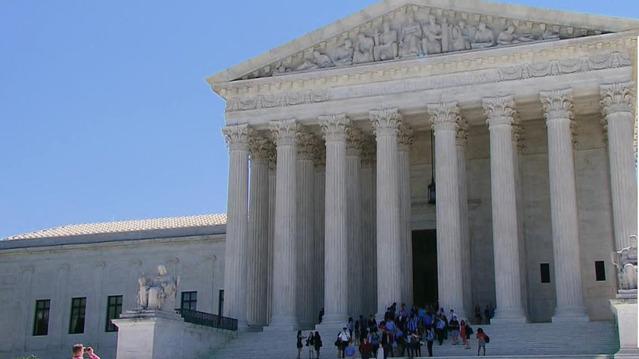Justices rule against EPA power plant mercury limits
WASHINGTON (AP) — The
Supreme Court ruled Monday against the Obama administration's attempt to
limit power plant emissions of mercury and other hazardous air
pollutants, but it may only be a temporary setback for regulators.
The justices
split 5-4 along ideological lines to rule that the Environmental
Protection Agency did not properly take costs into account when it first
decided to regulate the toxic emissions from coal- and oil-fired
plants.
The EPA did factor in
costs at a later stage, when it wrote standards that are expected to
reduce the toxic emissions by 90 percent. But the court said that was
too late.
The rules, which
took effect in April, will remain in place while the case goes back to a
lower court for the EPA to decide how to account for costs,
environmental advocates say.
The
challenge was brought by industry groups and 21 Republican-led states,
which argued that the regulations were too costly for coal miners,
businesses and consumers.
Writing for the court, Justice Antonin Scalia said the EPA was unreasonable in refusing to consider costs at the outset.
"The
agency must consider cost — including, most importantly, cost of
compliance — before deciding whether regulation is appropriate and
necessary," Scalia said.
In dissent, Justice Elena Kagan said it was enough for EPA to consider costs later in the process.
The EPA said it is reviewing the court's decision and will determine any appropriate next steps once a review is completed.
"EPA is disappointed that
the Supreme Court did not uphold the rule, but this rule was issued more
than three years ago, investments have been made and most plants are
already well on their way to compliance," EPA spokeswoman Melissa
Harrison said.
"EPA already has an economic analysis that it can rely on to demonstrate that the public health benefits of the standards far outweigh the costs," Patton said.
The case is the latest in a string of attacks against the administration's actions to use the Clean Air Act to rein in pollution from coal-burning power plants.
Senate Majority Leader Mitch McConnell, R-Ky., called the ruling "a cutting rebuke to the administration's callous attitude." He said it "serves as a critical reminder" to state governors, who are awaiting more EPA rules this summer aimed at curbing pollution from coal-fired power plants that is linked to global warming.
White House spokesman Josh Earnest called out McConnell for reprising his suggestion that governors should flout EPA regulations. He said McConnell was not advocating in the best interests of the American public.
House Speaker John Boehner, R-Ohio, suggested that the high court ruling gives opponents an opening "to protect the jobs and energy that are still at risk under this administration."
In
the case of the mercury rules, the costs of installing and operating
equipment to remove the pollutants before they are dispersed into the
air are hefty — $9.6 billion a year, the EPA found.
But
the benefits are much greater, $37 billion to $90 billion annually, the
agency said. The savings stem from the prevention of up to 11,000
deaths, 4,700 nonfatal heart attacks and 540,000 lost days of work, the
EPA said.
Mercury accumulates in fish and is especially dangerous to
pregnant or breastfeeding women, and young children, because of concern
that too much could harm a developing brain.
A disproportionate share of the 600 affected power plants, most of which burn coal, are in the South and upper Midwest.
